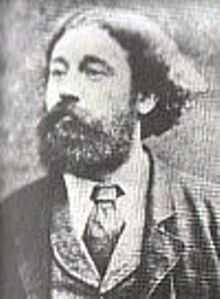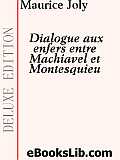Maurice Joly
| Maurice Joly | |
|---|---|
 Maurice Joly | |
| Born |
1829 Lons-le-Saunier, France |
| Died | 1878 (aged 48–49) |
| Occupation | Writer |
| Language | French |
| Nationality | French |
| French literature |
|---|
| by category |
| French literary history |
| French writers |
|
| Portals |
|
Maurice Joly (1829–1878) was a French satirist and lawyer known for his work titled The Dialogue in Hell Between Machiavelli and Montesquieu, later used as a basis for The Protocols of the Elders of Zion.
Life
He was born in Lons-le-Saunier to a French father and an Italian mother. He studied law, but stopped in 1849 in order to go to Paris, where he worked at the Ministry of State for 10 years. He successfully completed his legal studies and was finally admitted to the Paris bar in 1859.
His most famous work of fiction was the unattributed source material of the antisemitic forgery Protocols of the Elders of Zion. Joly was found dead on 14 July 1878, in his quai Voltaire apartment in Paris.

The Dialogue in Hell Between Machiavelli and Montesquieu
Joly is best known as author of the political satire entitled The Dialogue in Hell Between Machiavelli and Montesquieu (Dialogue aux enfers entre Machiavel et Montesquieu), which attacks the political ambitions of Napoleon III. It was first published in Geneva in 1864, and then in Brussels. The piece used the literary device of a dialogue between two diabolical plotters in Hell, the historical characters of Machiavelli and Montesquieu. In this way he tried to cover up a direct, and illegal, attack on Napoleon's rule. The pamphlets were smuggled into France for distribution, but were seized by the police immediately upon crossing the border. The police swiftly tracked down its author, and Joly was arrested and imprisoned for 15 months. The books were banned. On 25 April 1865, he was sentenced to a prison term of 15 months at Sainte-Pélagie.
Joly relates in his 1870 autobiography that one evening by the Seine he was inspired to write a dialogue between Montesquieu and Machiavelli. The noble baron Montesquieu would make the case for liberalism; the Florentine power broker Machiavelli would present the case for despotism. In this manner, Joly would communicate the secret ways in which liberalism might spawn a despot like Napoleon III.
Controversy about the book
Subsequent research points out that Joly appears to have plagiarized seven pages or more from a popular novel by Eugene Sue, namely Les Mystères du peuple (1849–1856).[1]
One of the few copies of the Dialogue to survive confiscation by Napoleon III's secret police found its way to Switzerland, where it was picked up by the Russian secret police Okhrana and served as the basis for The Protocols of the Elders of Zion.
Publications
- 1863: Le Barreau de Paris, études politiques et littéraires, Paris, Gosselin
- 1864: [signé : "Par un contemporain"], Dialogue aux enfers entre Machiavel et Montesquieu ou La politique au XIXe siècle, Bruxelles, A. Mertens et fils Electronic version on Gallica; later eds. Bruxelles 1868; Bruxelles 1868 (with name of the author); Paris, Calmann-Lévy, "Liberté de l'esprit" 1948; with preface by Jean-François Revel 1968.
- 1865: César, Paris, Martin-Beaupré frères, [1865]
- 1868: [signé : "Par un contemporain"], Recherches sur l'art de parvenir, Paris, Amyot
- 1870: Maurice Joly, son passé, son programme, par lui-même, Paris, Lacroix, Verboeckhoven
- 1872: Le Tiers Parti républicain, Paris, E. Dentu
- 1876: Les Affamés, étude de mœurs contemporains, Paris, E. Dentu
- On the stage
- 1983: Dialogue aux enfers entre Machiavel et Montesquieu (Paris, Petit Odéon, 31 mai 1983, adaptation théâtrale de Pierre Franck), Paris, Théâtre de l'Atelier, "Le Calepin", 1983.
References
- ↑ Eco, Umberto (1994). "Fictional Protocols". Six Walks in the Fictional Woods. Cambridge, MA: Harvard University Press. p. 135. ISBN 0-674-81050-3.
External links
| Wikisource has original text related to this article: |
- Works by Maurice Joly at Project Gutenberg
- Works by or about Maurice Joly at Internet Archive
- Joly, Maurice: Son passé, son programme. Par lui-même. Lacroix, Verboeckhoven et Ce, Paris 1870 (Autobiography by Joly in French, found in the Documents of the Berne Trial, State Archive Bern), copy from Paris, Bibl. Nat.
|